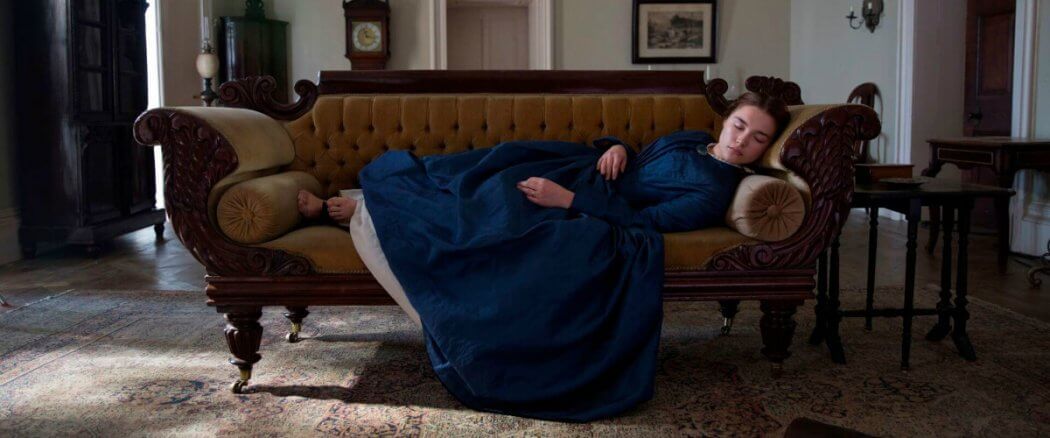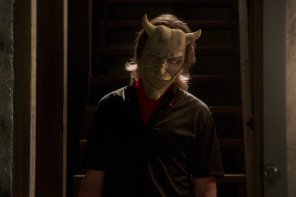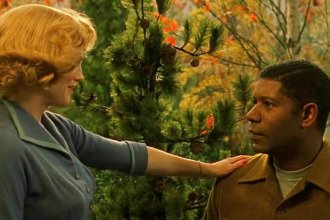I’ve been really into horror films lately, but not the type you might have in mind. I’m talking less about Texas Chainsaw Massacre and more Suspiria; not so much A Nightmare on Elm Street as Mulholland Drive. Yes, I know that latter choice probably isn’t “horror” by many classifications, but I think it fits the hallmarks I look for in horror, namely an atmospheric dread and some sense of ambiguity.
Really, that second choice is what I find more horrifying than any masked killer or spattering blood. Whether it’s a central mystery or some sort of nonlinear narrative, I often find myself uneasy when trying to digest stories that don’t follow particular guidelines on how stories “ought” to be told. That doesn’t always equal horror, but coupled with the correct characters and atmosphere, it’s easy to flip ambiguity on its head and transform it into something altogether terrifying.
This month, I took in probably the most terrifying movie I’ve seen in the past few years. It’s a film so dark and unyielding, you could practically feel the joy draining from each darkly comic moment, turning them into something altogether more sinister. I’m talking, of course, about William Oldroyd’s Lady Macbeth.
Something More Than Unhappiness
The first instance I thought something was wrong with Katherine — a haunting Florence Pugh — was the first shot of the film. It’s a scene that sticks out particularly as we learn Katherine’s circumstances: trapped in a cold, loveless, and probably arranged marriage with a strange, controlling man; ruled by her ruthless father-in-law.
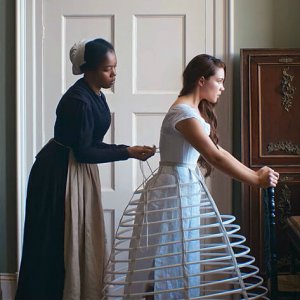 And yet, this first scene betrays something more than unhappiness on Katherine’s face. What would we expect to see? Grief, perhaps. Maybe even resignation. Instead, Katherine’s demeanor is analytical, probing even. In each horrible moment Katherine lives, there is never sadness, only a sort of pronounced boredom.
And yet, this first scene betrays something more than unhappiness on Katherine’s face. What would we expect to see? Grief, perhaps. Maybe even resignation. Instead, Katherine’s demeanor is analytical, probing even. In each horrible moment Katherine lives, there is never sadness, only a sort of pronounced boredom.
It’s this boredom that tells us quickly we’re not to be rooting for this woman, despite the overwhelming urge to do so at first. In fact, Lady Macbeth starts out as a story of female empowerment, yearning to be set free. Katherine isn’t the only trapped woman in the house; her maid, Ana, is clearly the recipient of years of abuse and shame. And despite their similar circumstances, there is never a moment of pity or even empathy.
I’ll get to how this informs my whole opinion of the film in a bit. But it’s important to understand how little feeling Katherine has for those around her, especially those who find themselves subservient, yet somehow equal to her. Which brings us to Sebastian.
“I’d Rather Stop You Breathing…”
While her husband and father-in-law are away, Katherine takes the opportunity to explore some newfound freedoms. She’s not usually allowed to spend time outside the house or otherwise do anything that might besmirch her family’s name. So when the men are away, Katherine will play. She begins by simply taking long, quiet walks out into the fields, soaking up the windy, cold air as if it were feeding her soul.
But while checking in on a disturbance amongst her household servants, she meets the new field hand, Sebastian — Cosmo Jarvis giving the tortured performance of the year so far. The two soon begin a torrid affair that spins into something… well, let’s just say this movie isn’t centered around sex. And while there could be full articles written about Katherine and Sebastian’s interactions, I think highlighting three of them is important to understanding Katherine, the key task that drives the film.
When the two initially meet, Sebastian is taking the lead in torturing Ana. He and the other male servants have seemingly stripped her naked, thrown her up in a pig scale and — as it’s lightly suggested — raped her. This is the scene Katherine stumbles upon in first meeting Sebastian. And like I said earlier, it’s a key moment to understanding Katherine’s mindset on two fronts. She tells the men to let Ana down, but what follows is by far the most interesting part of the scene. She harshly tells Ana to get dressed and go back to work while half-heartedly scolding the men for wasting her husband’s time and money. But again, there is no pity or shock at the activities happening. Instead, we’re back to Katherine’s curious eye, this time trained on Sebastian. She bluntly asks him how much she would weigh if he were to put her in the scale. After a brief struggle to get her in, she curtly walks away.
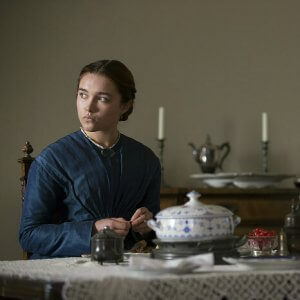 The second comes later that night when Sebastian makes his way into Katherine’s room. It’s one of the film’s more disturbing scenes — which believe me is saying something — as Sebastian repeatedly forces himself on Katherine. The two dance around the room for about a minute, with him making aggressive passes every 10 seconds or so. But instead of calling out, Katherine merely does the crass, horrible dance with him. Eventually, she pounces on him setting the rest of the film in motion. There’s a sort of sick twist to the whole thing, an interaction that mirrors what will be become a questionably abusive relationship.
The second comes later that night when Sebastian makes his way into Katherine’s room. It’s one of the film’s more disturbing scenes — which believe me is saying something — as Sebastian repeatedly forces himself on Katherine. The two dance around the room for about a minute, with him making aggressive passes every 10 seconds or so. But instead of calling out, Katherine merely does the crass, horrible dance with him. Eventually, she pounces on him setting the rest of the film in motion. There’s a sort of sick twist to the whole thing, an interaction that mirrors what will be become a questionably abusive relationship.
Finally, when the two are out in the fields together one afternoon, they share a conversation. It’s one had by most 20-something couples. “Do you love me?” Katherine asks of Sebastian. “Could you live without me?” He replies affirmatively. Then Katherine says a line so quick and so matter-of-fact it almost comes off as innocent, if only Oldroyd hadn’t been tipping us off to Katherine’s nature beforehand. Instead, it sticks out slightly, and in time becomes the film’s tipping point.
“I’d rather stop you breathing than have you doubt how I feel.”
Moral Ambiguity: A Blessing and a Curse
I’m going to refrain from saying much more about the plot to Lady Macbeth. It’s a film that must be experienced and chewed on before forming a hard opinion. And it’s likely to draw many strong opinions.
Instead, I want to finish off this reflection by talking about moral ambiguity and film. I’ve often been a proponent of films that don’t tell you one way or the other how to feel. In a way, a director that doesn’t spell out emotion is one that trusts his or her audience to know what they’re experiencing and how to process it. Some of my favorite films sit on this axis of feeling and morality.
However, I also think the best examples of morally ambiguous tales have a complete arc. I don’t want to overuse the term “fable” because I don’t think everything needs to have a baked-in lesson. But there is a fable-like quality to these sorts of films. They may be dark as night, but there’s usually some sort of redemptive element to them. I often turn to There Will Be Blood as an example. I even wrote about it for Cinema Faith at one point. By the end of that film, after we’ve traveled with Daniel Plainview through most of his adult life, we see the destruction he brings on himself. While financially successful, there can be no arguing that he reaps what he sows. His story may be dark, but it is whole.
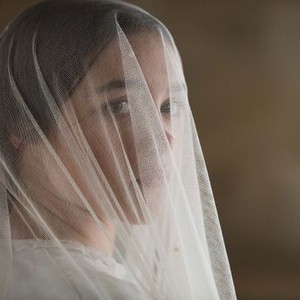 This is where I’m having trouble coming to terms with Lady Macbeth. It is truly one of the darker films I’ve seen in my life, and I’ve seen a few. The audience was littered with laughter several times throughout the film, and I suspect those laughs stemmed from discomfort. Believe me, there is nothing funny about it. Even in moments I found darkly amusing, I was instantly quelled by another wave of stiff shock. All of these moments lead me to say this: there can be no questioning that the film is successful in its aim to rouse immense disquiet in your soul.
This is where I’m having trouble coming to terms with Lady Macbeth. It is truly one of the darker films I’ve seen in my life, and I’ve seen a few. The audience was littered with laughter several times throughout the film, and I suspect those laughs stemmed from discomfort. Believe me, there is nothing funny about it. Even in moments I found darkly amusing, I was instantly quelled by another wave of stiff shock. All of these moments lead me to say this: there can be no questioning that the film is successful in its aim to rouse immense disquiet in your soul.
But unlike some of its dark forebearers, Lady Macbeth is not whole. This may be a bit of a spoiler, but there is no redemptive mark at which to point or moral ground on which to stand. I don’t believe Oldroyd is endorsing Katherine’s behavior, rather painting a picture of a woman with an unquestionably fractured soul. But leaving the theater after this film means leaving with either an incomplete story or an unwaveringly nihilistic view of the world.
The transcendentalist minister Theodore Parker once said, “I do not pretend to understand the moral universe; the arc is a long one… And from what I see I am sure it bends towards justice.” I, for one, believe this to be true. And it’s this belief that keeps me from finding the triumphs of Lady Macbeth to be worth celebrating. At this point, it’s a critically celebrated movie, and it’s not hard to see why. It’s gorgeous, atmospheric, technically sound, and artistically brilliant. But all the mastery in the world isn’t worth it when all I’m left with is a broken world and no justice in sight.

